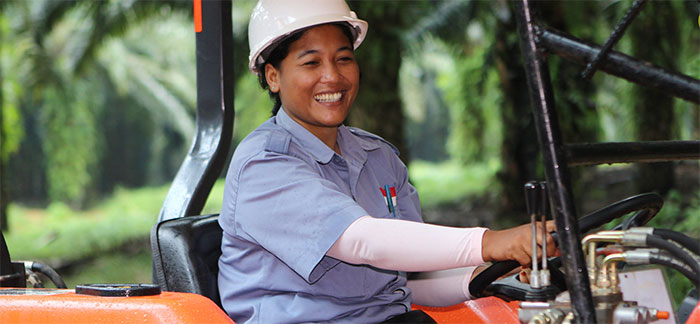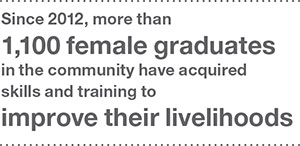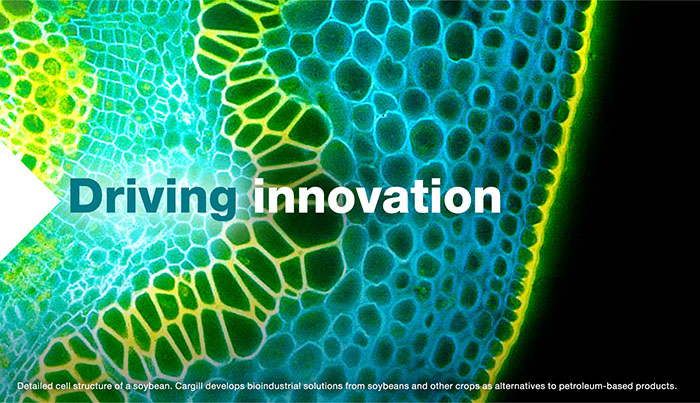Innovation fuels progress. In a rapidly changing world, Cargill is developing new products and services that meet shifting expectations and anticipate future needs. Across the spectrum of our businesses, creative thinking is unlocking new possibilities.

New products, today and tomorrow
 In addition to knowing more about their food and where it comes from, what are consumers asking for today?
In addition to knowing more about their food and where it comes from, what are consumers asking for today?
Dow: Consumers don’t want to see a product with 25 different ingredients that have complicated names. They want to see simple ingredients they are familiar with, ones they might even have in their own pantry. This means delivering the same functionality with much simpler products, which requires innovative thinking. Yet some things have remained constant: They want it to taste great, and be convenient and affordable.
What are some examples of Cargill products that meet the nutrition profiles consumers want now?
Consumers are looking to do things like reduce sugar and shift to different kinds of fats. Regarding sugar, we’ve developed multiple generations of branded zero-calorie sweeteners made from stevia. The latest in this line, EverSweet™, uses compounds that are found in very small quantities in the stevia leaf. To produce enough for our customers, we developed an innovative fermentation process.
We also are infusing canola oil with omega-3 fatty acids, which are in demand. This oil is perfectly suited for products like health drinks and nutrition bars. Today, omega-3s predominantly come from fish, so to contribute to the sustainability of marine fishing, we are exploring ways to produce this ingredient from plants and algae.
What else does Cargill need to watch in terms of innovation?
The one constant is that the industry changes all the time. With all of our product development, Cargill is thinking about generations one, two and three. We’re focusing today on what our customers will expect in years to come.
Making All Day Breakfast a reality

 McDonald’s customers, particularly millennials, made it clear their top priority was being able to purchase Egg McMuffin® sandwiches, biscuit sandwiches and other signature breakfast items whenever they wanted. But rolling out All Day Breakfast at its 14,000 stores in the U.S. required McDonald’s to find solutions for logistical and supply chain challenges. Foremost among them was finding a way to cook both breakfast and regular menu items side by side in an efficient, food-safe and consistent way.
McDonald’s customers, particularly millennials, made it clear their top priority was being able to purchase Egg McMuffin® sandwiches, biscuit sandwiches and other signature breakfast items whenever they wanted. But rolling out All Day Breakfast at its 14,000 stores in the U.S. required McDonald’s to find solutions for logistical and supply chain challenges. Foremost among them was finding a way to cook both breakfast and regular menu items side by side in an efficient, food-safe and consistent way.
Cargill worked with McDonald’s in our replica kitchen to rethink every procedure across thousands of tests. Doing so ensured that the eggs were cooked to McDonald’s Gold Standard alongside other products.
Since launching in October 2015, All Day Breakfast has positively impacted financial results. For the last three months of 2015, McDonald’s posted its best quarterly sales in nearly four years, with sales jumping 5.7 percent at U.S. restaurants open at least 13 months.
“The best way McDonald’s can meet and exceed our customers’ changing expectations is through strong relationships like the one we have with Cargill,” said Marion Gross, senior vice president and chief supply chain officer of McDonald’s North America. “Cargill was with us every step of the way, from kitchen testing to training our crew—and that’s what makes them a truly valued member of our supply chain.”
Reducing antibiotics for animal protein
 We recently announced we are eliminating 20 percent of shared-class antibiotics – those used to protect the health of both animals and people – from our U.S. beef cattle feed yards and several additional feed yards operated by supplier Friona Industries. The move will affect 1.2 million head of cattle annually.
We recently announced we are eliminating 20 percent of shared-class antibiotics – those used to protect the health of both animals and people – from our U.S. beef cattle feed yards and several additional feed yards operated by supplier Friona Industries. The move will affect 1.2 million head of cattle annually.
We also are driving change in turkey production, a category where just 10 percent of the products available from U.S. retailers are antibiotic-free. Cargill already offered consumers a choice with antibiotic-free turkey, but we didn’t stop there. We moved to eliminate growth-promoting antibiotics entirely from our Honeysuckle White® and Shady Brook Farms® consumer brands, completing the project in 2015.
With interest continuing to grow, we are developing new ways to lower antibiotic usage. Ongoing research includes increased vaccines, shifting to antibiotics that aren’t used in human medicine, improved feed regimens, and non-medicinal methods to maintain animal health.
For example, Cargill researchers are looking at the role that essential oils can play in poultry to promote feed efficiency and keep birds healthy. We are finding that certain essential oil compounds have a broad, positive effect on digestive health. As growth-promoting antibiotics are reduced, Cargill is exploring these kinds of alternatives to ensure animal well-being.
Stabilizing farmer incomes amid currency swings
 Over the last several years, political and economic uncertainty in Brazil has sent its currency, the real, on a bumpy decline against the U.S. dollar that became particularly steep in 2015. Brazilian farmers’ livelihoods rose and fell as the currency moved sharply and injected considerable ambiguity into their farm operations and grain marketing.
Over the last several years, political and economic uncertainty in Brazil has sent its currency, the real, on a bumpy decline against the U.S. dollar that became particularly steep in 2015. Brazilian farmers’ livelihoods rose and fell as the currency moved sharply and injected considerable ambiguity into their farm operations and grain marketing.
In response, Cargill developed a new approach. We gave farmers the option to buy fertilizer and other crop inputs in reals or U.S. dollars and, later, sell their grain to us in the same currency – insulating them from exchange rate volatility. With the turbulent market environment, securing financing for each new crop year also became increasingly important. As publicly funded sources for this financing decreased, Cargill stepped in to fill the gap. Bundling our services made it possible to offer an integrated package of crop inputs, risk management and financing all at the same time.
Farmers have recognized the value of this approach, with an increasing number enrolling in the program. Although Cargill has long had specialized packages of services tailored to the needs of farmers in other parts of the world, we were one of the first agricultural companies to take this route in Brazil.
Bioindustrial products in the home
Cargill develops innovative products made from renewable resources to replace traditional petroleum-based materials in many household items. Welcome to the smarter, friendlier home of tomorrow.

Driving women's empowerment in the palm sector

 To address the gender gap in the palm industry, Cargill has developed programs that help both women employees and community members pursue career and economic advancement.
To address the gender gap in the palm industry, Cargill has developed programs that help both women employees and community members pursue career and economic advancement.
At our oil palm plantations in Indonesia, we are hiring and training women for traditionally male-dominated jobs like harvesters, security guards and paramedics. We also offer employee programs on women’s nutrition, pregnancy and other health information.
In Indonesia, low rates of female literacy and high gender disparity in schools indicate that women are often excluded from the education system. At Cargill’s Yayasan Masa Depan Cerah Education Foundation (“Hope for a Brighter Future”), more than half of the teachers are women, and the student population is evenly divided between boys and girls.

